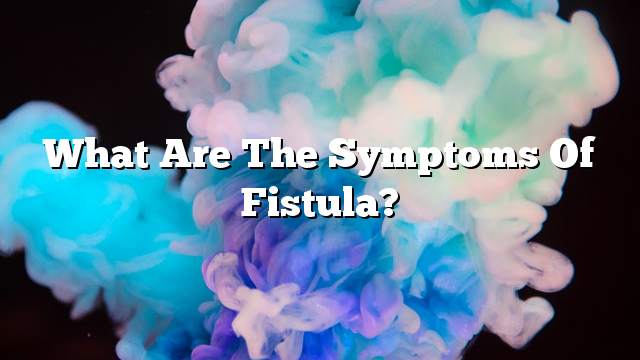Fistula
Fistula is defined as an abnormal presence of a channel that binds two organs or blood vessels so that there is no association between them in the normal state, such as when it is present between the intestine, the skin, and the vagina (Vagina) and the anus (Rectum). The causes that cause it are varied. For example, uncomplicated labor is one of the most common causes of fistula in Africa. Crohn’s disease and diverticular disease can also cause fistula. Fistula increases in people who have been exposed to radiation therapy (Radiation Therapy).
Symptoms of fistula
Symptoms of gastrointestinal fistula
Gastrointestinal Fistula (Gastrointestinal Fistula) is characterized by four types: Gastrointestinal Fistula (intestinal fistula), which occurs through two parts of the intestine, and the extraintestinal fistula, which occurs between the intestine and a member Another in the body, the external fissula, in which a part of the digestive tract is transferred to the skin, and the complex Fistula, which occurs across several organs in the body.
Symptoms of external fistula include:
As for the symptoms of internal fistula, they are as follows:
- Diarrhea (Diarrhea).
- Rectal Bleeding.
- Bloodstream Infection or Sepsis is one of the most serious symptoms and complications requiring urgent medical intervention. It can cause a serious reduction in blood pressure, damage to the organs, and may lead to death.
- Poor absorption of nutrients and loss of weight.
- Dehydration.
- Worsening Of The Underlying Disease.
Symptoms of fistula fistula
Vaginal fistula (Vaginal vaginal fistula), which is characterized by the leakage or flow of vaginal fluid, the rectal vaginal fistula (Rectovaginal Fistula), and the fistula Colovaginal Fistula, Enterovaginal Fistula, and the last three types of vaginal discharge are foul odors or vaginal gases.
Symptoms of bladder fistula
If you have Urinary Tract Infection (UR), you may have bladder obstruction. If you have urinary tract infection, there are some symptoms that indicate a bladder in the bladder such as a urine-like smell or urinary appearance Stool, or gaseous excretion of urine and ureter (Urethra) during urination.
Symptoms of lymphatic fistula
Perilymph Fistula is defined as a hole and abnormal gap between the middle ear of the air and an inner ear filled with fluids. The most important symptoms are:
- Dizziness and Vertigo.
- Hearing-related symptoms such as tinnitus and hearing loss.
- Unbalance.
- Motion Intolerance.
- Nausea, and Vomiting.
- Pressure Sensitivity, a symptom that is characterized by lymphatic fistula from other internal ear disorders.
- Tullio’s Phenomenon, which means sensitivity to loud sounds.
Treatment of fistula
After the diagnosis of fistula is diagnosed by specialists in the field, such as Gynecologist, Urogynecologists, or Colorectal Surgeon, the procedure and treatment plan for fistula is chosen. The location, size, and general health status of the patient. The rate of success of fistula treatment of high rates, so must be accelerated treatment immediately, as leaving untreated is a significant threat to the body of the patient. The most important ways to treat fistula:
- Catheterization: The catheter is usually used in small fistula cases to control infections, and the catheter works to drain existing fluids.
- Vibrin use: Fibrin Glue is a special medical adhesive used to seal and close the fistula tightly.
- Using filler: The fill is known as a collagen matrix, which is used to fill the fistula channel.
- Surgery across the abdominal wall: Transabdominal surgery is achieved through fistula in the abdominal wall (Abdominal Wall).
- Laparoscopic Surgery: A laparoscopic surgical incision is made, and a small camera and equipment are used to repair and treat fistula.
- Drug therapy: Although there is no pharmaceutical treatment yet to treat fistula itself, antibiotic and other types of medication can be used to treat fistula infection.
